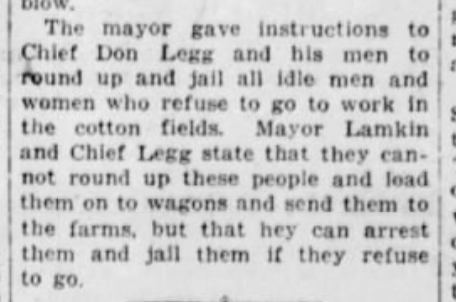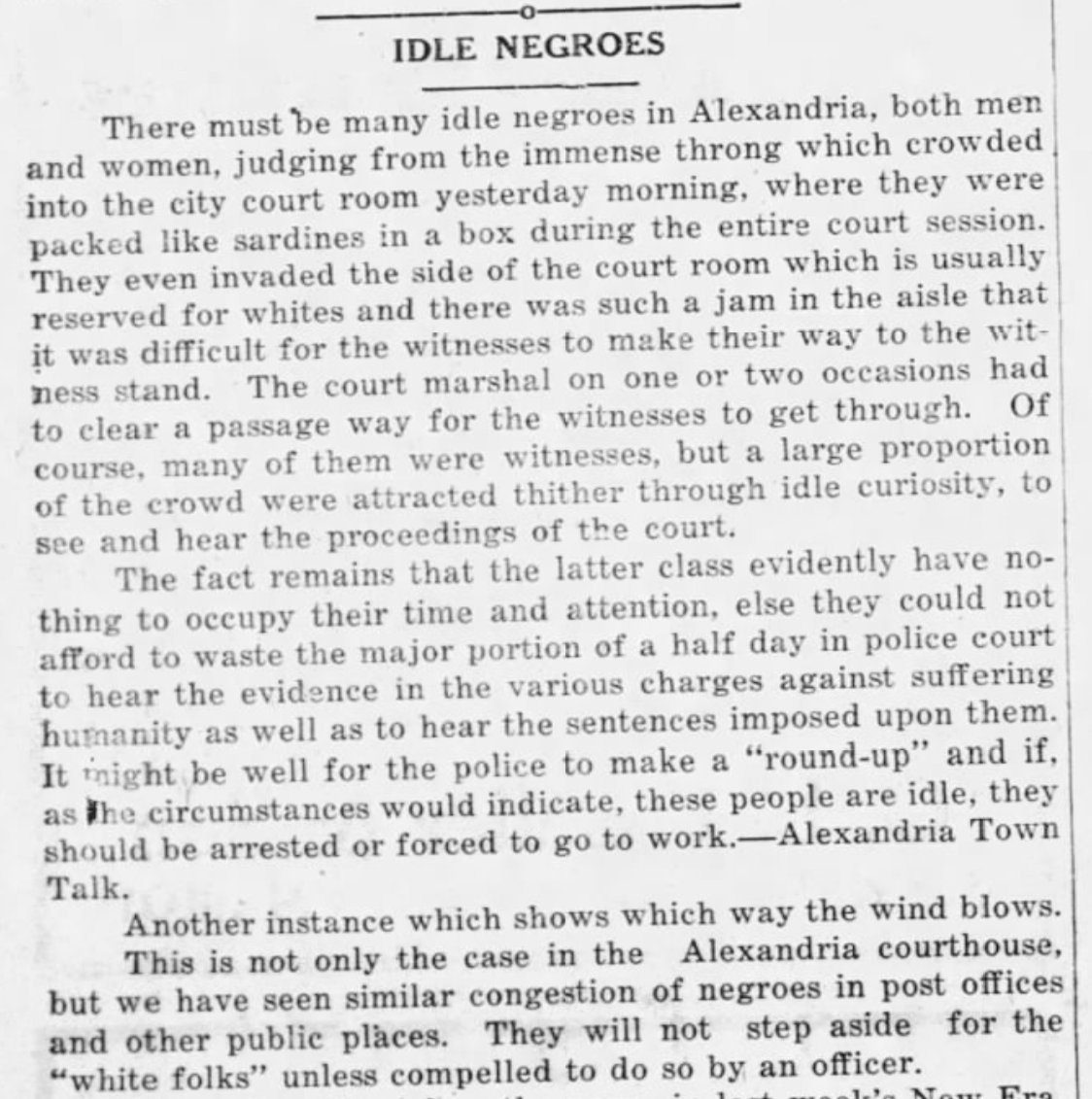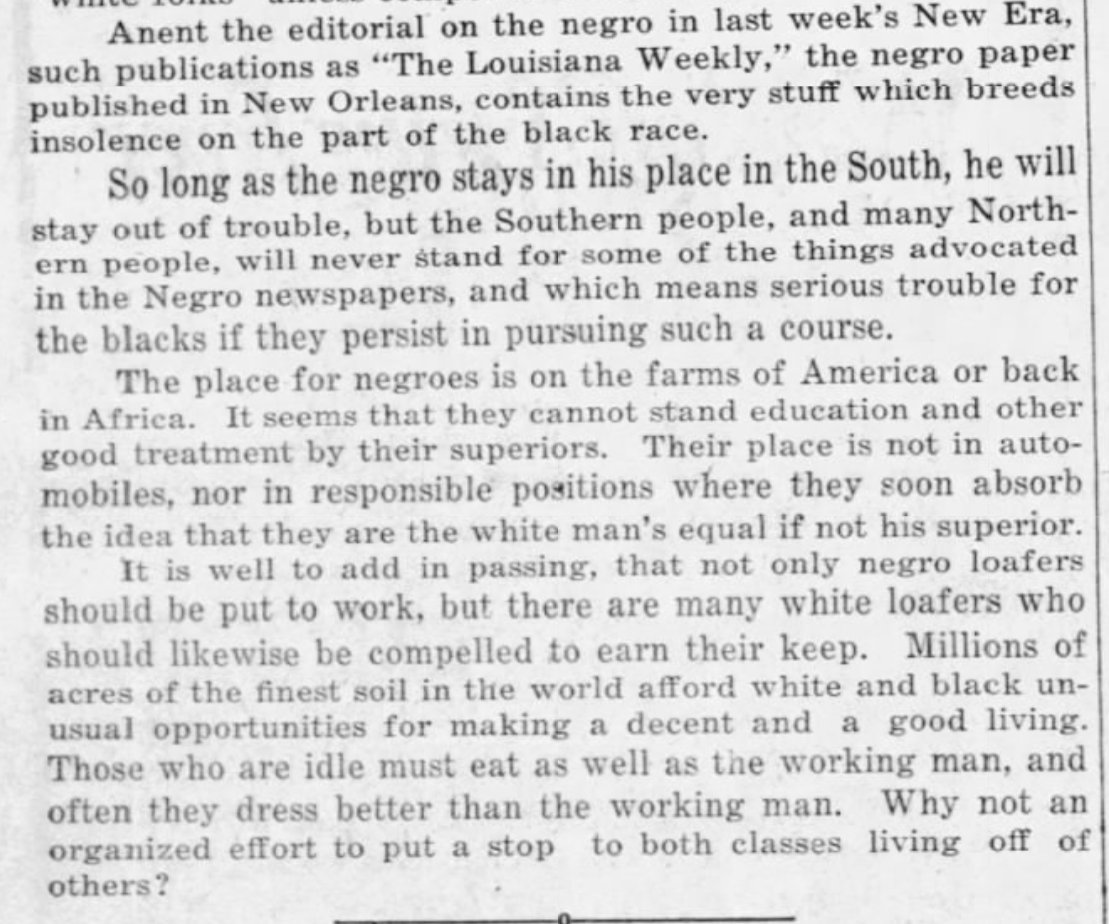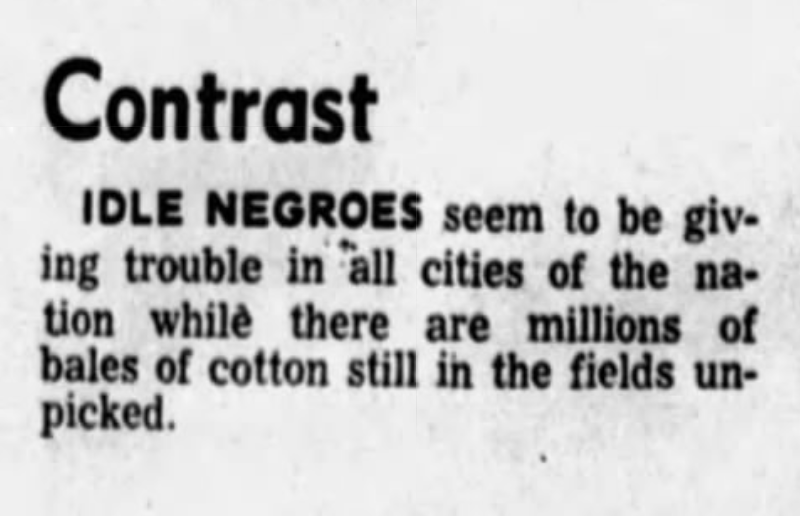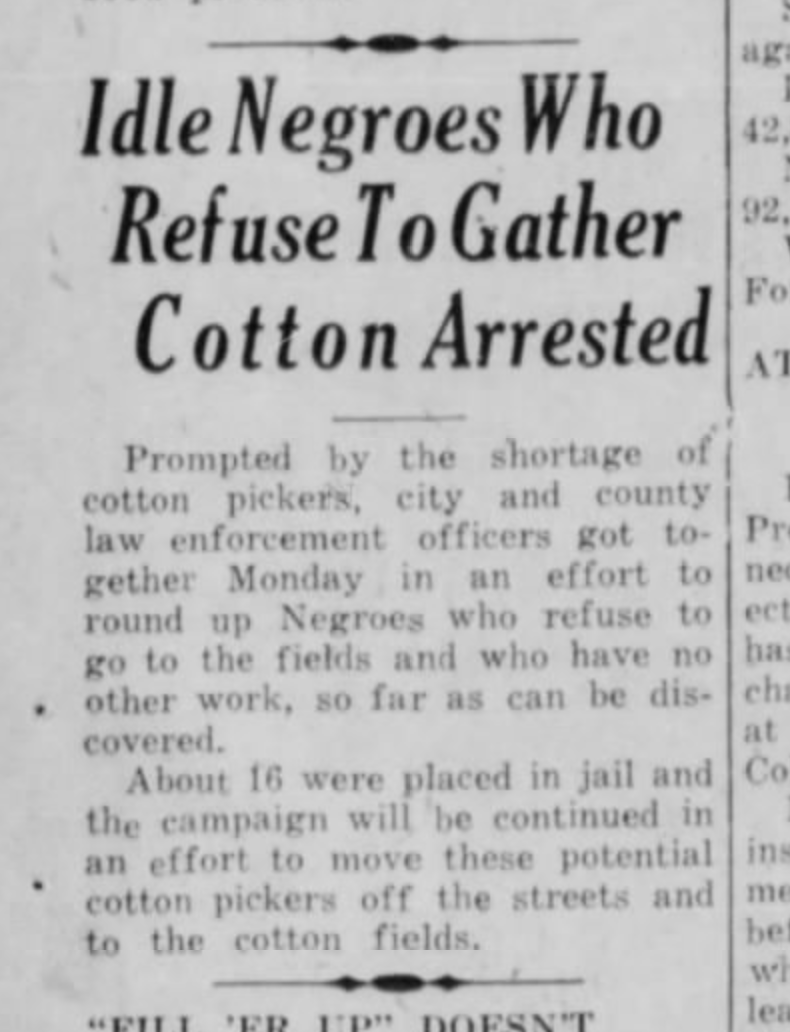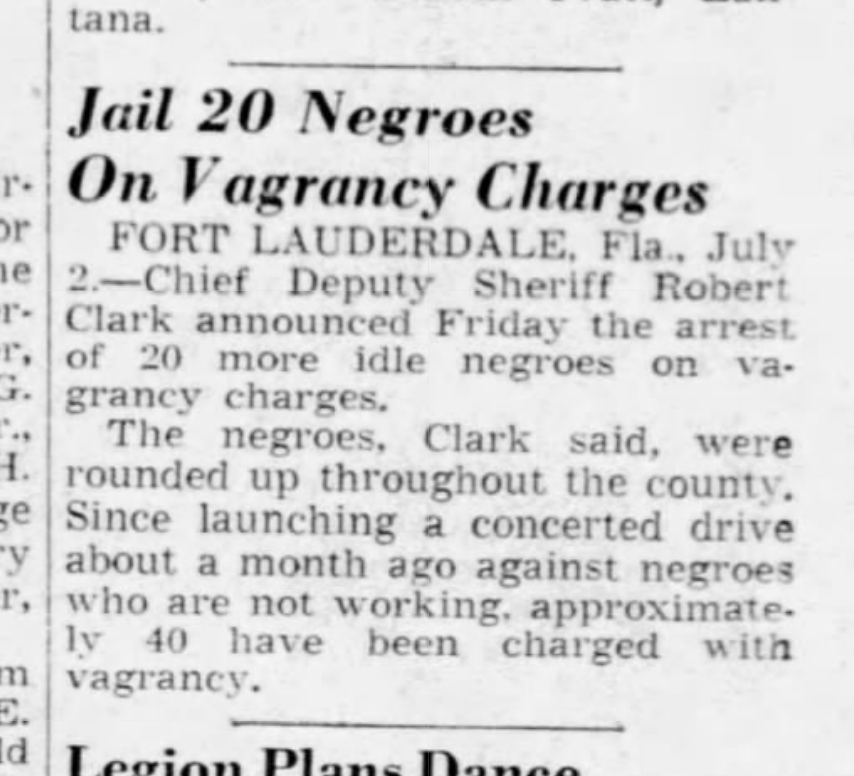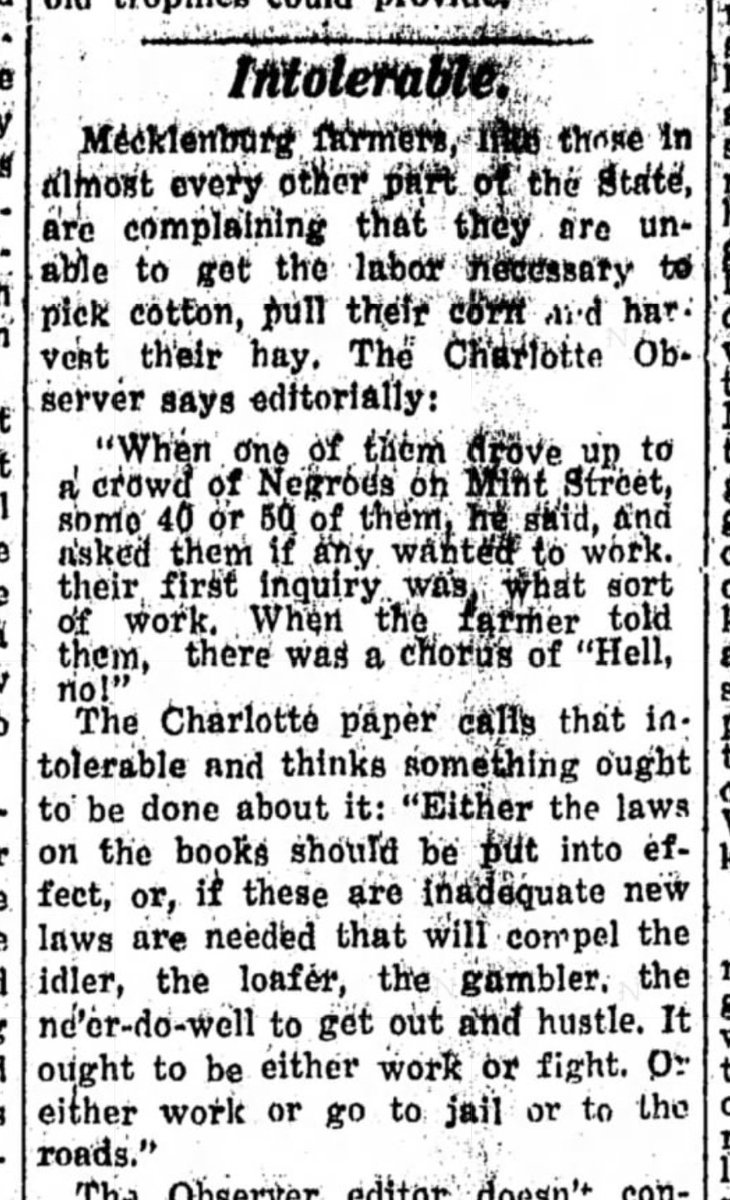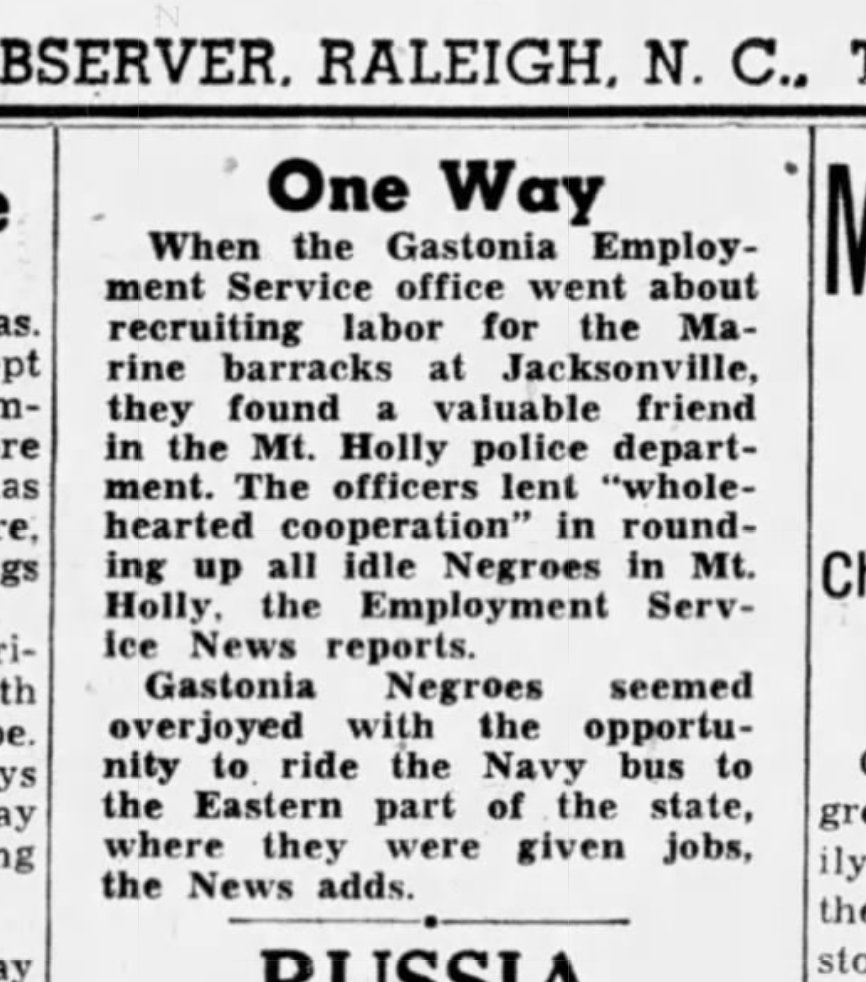In small-town Louisiana, it was still cool in 1926 to arrest "idle negroes" who weren& #39;t working for local white farmers.
Once their labor force was captive, farmers would bail them out "as fast as they were locked up" and put them to work to pay off their bail.
Once their labor force was captive, farmers would bail them out "as fast as they were locked up" and put them to work to pay off their bail.
(The Rayne Tribune, Oct. 9, 1926.)
Still happening in Shreveport in 1945.
And note the union involvement. People don& #39;t realize how much of the anti-union sentiment in the south is based on the desire to continue ownership over the labor of black people after 1865.
(Shreveport Times, Feb. 10, 1945.)
And note the union involvement. People don& #39;t realize how much of the anti-union sentiment in the south is based on the desire to continue ownership over the labor of black people after 1865.
(Shreveport Times, Feb. 10, 1945.)
Arresting black people "because of complaints received from many local industries that they are unable to keep workers on the job."
"Many companies have agreed to furnish the [police] with the names and records of employees who leave the job."
(Shreveport Times, June 28, 1944.)
"Many companies have agreed to furnish the [police] with the names and records of employees who leave the job."
(Shreveport Times, June 28, 1944.)
"Twenty idle negroes were taken into custody by city police on Lee street yesterday." 12 said they had jobs; no matter.
(Alexandria Town Talk, Aug. 11, 1943.)
(Alexandria Town Talk, Aug. 11, 1943.)
"& #39;Idle negroes in Alexandria are either going to the cotton fields and pick cotton, or they are going to jail,& #39; said Mayor Lamkin today."
(Alexandria Town Talk, Oct. 1, 1931.)
(Alexandria Town Talk, Oct. 1, 1931.)
"Mayor Lamkin and Chief Legg state that they cannot round up these people and load them onto wagons and send them to the farms, but that they can arrest them and jail them if they refuse to go."
"It seems that they cannot stand education and other good treatment by their superiors.
"Their place is not in automobiles, nor in responsible positions where they would soon absorb the idea that they are the white man& #39;s equal if not his superior."
"Their place is not in automobiles, nor in responsible positions where they would soon absorb the idea that they are the white man& #39;s equal if not his superior."
"Idle negroes seem to be giving trouble in all the cities of the nation while there are millions of bales of cotton still in the field unpicked."
(The Alabama Journal, Montgomery, Oct. 18, 1961.)
(The Alabama Journal, Montgomery, Oct. 18, 1961.)
"Prompted by a shortage of cotton pickers, city and county law enforcement got together Monday in an effort to round up Negroes who refuse to go to the fields...
"About 16 were placed in jail and the campaign will be continued..."
(The Bryan Eagle, Texas, Sept. 11, 1945.)
"About 16 were placed in jail and the campaign will be continued..."
(The Bryan Eagle, Texas, Sept. 11, 1945.)
"The negroes were rounded up by the marshal and booked. Under present conditions and due to the labor shortage idle negroes are urged to get jobs or face vagrancy charges."
(The Cameron Herald, Texas, July 29, 1943.)
(The Cameron Herald, Texas, July 29, 1943.)
"Since launching a concerted drive about a month ago against negroes who are not working, approximately 40 have been charged with vagrancy."
The sheriff "reiterated Monday that the negroes are either going & #39;to work or fight or get out of the county.& #39;"
(Miami Herald, 1943.)
The sheriff "reiterated Monday that the negroes are either going & #39;to work or fight or get out of the county.& #39;"
(Miami Herald, 1943.)
In Clearwater, Fla., the target was "idle negroes loafing in beer parlors and on the corners in the negro section."
And a special focus: "negro women who formerly worked" but "now lived on the allotment sent back by their husbands in the Army."
(St. Petersburg Times, 4/27/43.)
And a special focus: "negro women who formerly worked" but "now lived on the allotment sent back by their husbands in the Army."
(St. Petersburg Times, 4/27/43.)
What prompted the roundups? Concern that "the negroes demanded shipyard salaries or they would not work. Some...have been making from $15 to $20 a day."
(St. Petersburg Times, April 21, 1943.)
(St. Petersburg Times, April 21, 1943.)
When a man drove up to a group of black people and "asked them if any wanted to work, their first inquiry was, what sort of work. When the farmer told them, there was a chorus of & #39;Hell, no!& #39;"
This was "Intolerable" to the editor of the Statesville (N.C.) Landmark, 10/8/42.
This was "Intolerable" to the editor of the Statesville (N.C.) Landmark, 10/8/42.
Military recruiters "found a valuable friend in the Mt. Holly (NC) police department. The officers lent & #39;wholehearted cooperation& #39; in rounding up all idle Negroes in Mt. Holly."
(Raleigh News & Observer, Aug. 6, 1942.)
(Raleigh News & Observer, Aug. 6, 1942.)

 Read on Twitter
Read on Twitter
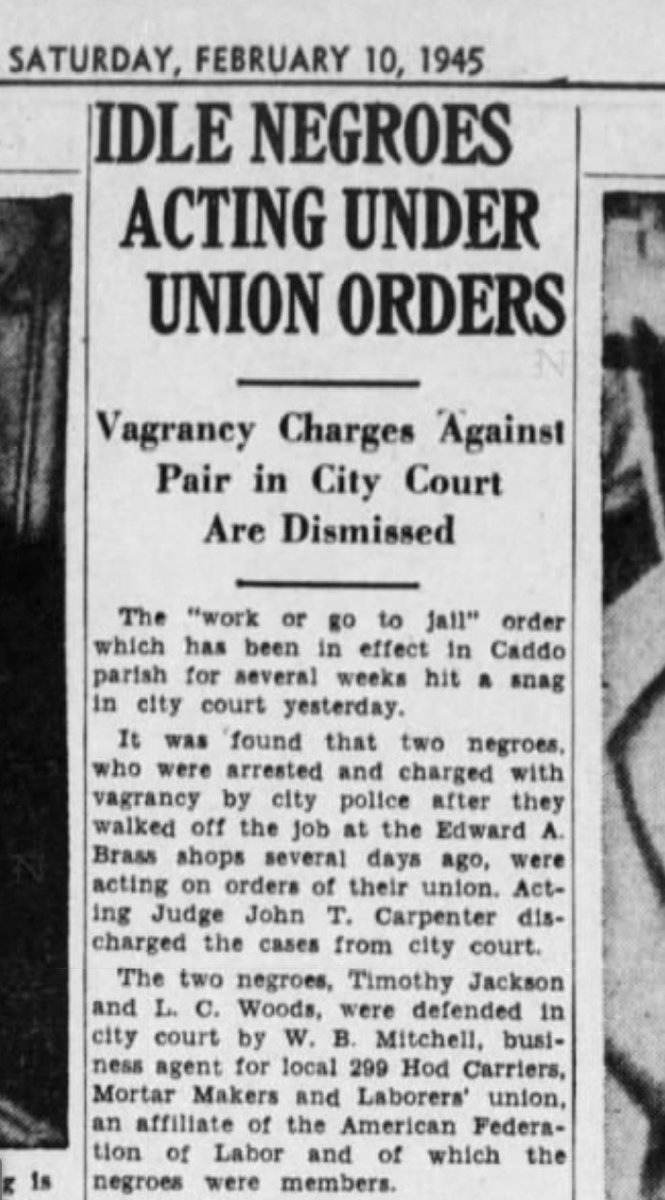
![Arresting black people "because of complaints received from many local industries that they are unable to keep workers on the job.""Many companies have agreed to furnish the [police] with the names and records of employees who leave the job."(Shreveport Times, June 28, 1944.) Arresting black people "because of complaints received from many local industries that they are unable to keep workers on the job.""Many companies have agreed to furnish the [police] with the names and records of employees who leave the job."(Shreveport Times, June 28, 1944.)](https://pbs.twimg.com/media/EmUeG_HXEAAPeNr.jpg)
![Arresting black people "because of complaints received from many local industries that they are unable to keep workers on the job.""Many companies have agreed to furnish the [police] with the names and records of employees who leave the job."(Shreveport Times, June 28, 1944.) Arresting black people "because of complaints received from many local industries that they are unable to keep workers on the job.""Many companies have agreed to furnish the [police] with the names and records of employees who leave the job."(Shreveport Times, June 28, 1944.)](https://pbs.twimg.com/media/EmUeG_LW4AIZh5v.png)


